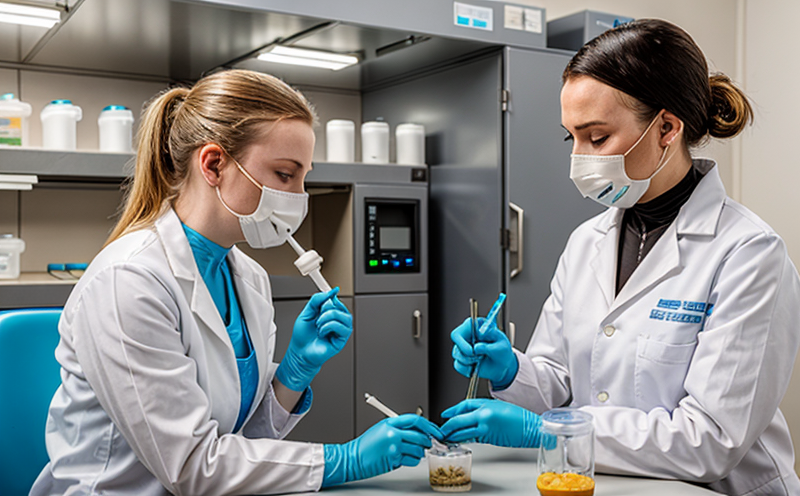EN 21580 Ergot Alkaloid Profiling in Flour Products
The European Standard EN 21580 is a critical tool for food safety and quality assurance, specifically targeting the analysis of ergot alkaloids in flour products. Ergot, a fungal infection that can affect grains like wheat, barley, and rye, produces harmful mycotoxins that pose serious health risks if present in high concentrations. This standard provides a robust framework for identifying and quantifying these toxins to ensure they do not exceed safe limits as stipulated by food safety regulations.
The methodology outlined in EN 21580 is designed to be comprehensive, ensuring accurate and precise detection of ergot alkaloids including ergotoxin and its derivatives. This service is essential for quality managers, compliance officers, R&D engineers, and procurement teams who need to maintain the highest standards of food safety and quality. By adhering to this standard, laboratories can provide reliable data that supports regulatory requirements and enhances consumer trust.
The process begins with the collection and preparation of flour samples, which is critical for accurate analysis. After sampling, the specimen undergoes a series of steps including extraction, cleanup, and quantification using advanced analytical techniques such as High-Performance Liquid Chromatography (HPLC) coupled with Mass Spectrometry (MS). This ensures that even trace amounts of ergot alkaloids are detected.
The standard's scope extends beyond mere detection; it also mandates the reporting of results in a manner that is both compliant and informative. Reporting includes not just quantification but also qualitative data, which helps in understanding the types and concentrations of ergot alkaloids present. This information is invaluable for tracing contamination sources and implementing corrective measures.
Compliance with EN 21580 ensures that food products meet international safety standards set by organizations like the European Commission and World Health Organization (WHO). This alignment enhances market access and consumer confidence, which are crucial in today's competitive global food industry. The service offered goes beyond mere compliance; it provides actionable insights into potential risks and mitigation strategies.
Understanding the implications of ergot alkaloids requires a deep dive into their effects on human health. Chronic exposure to these toxins can lead to neurological disorders such as St Anthony’s Fire, characterized by severe burning sensations in the skin. Acute ingestion, particularly from contaminated grain products, has been linked to more serious conditions like ergotism (rare but highly debilitating). Ensuring that food products are free of harmful levels of ergot alkaloids is thus not just a regulatory requirement but a public health imperative.
The EN 21580 standard is underpinned by rigorous quality control measures and validated methodologies, ensuring that the results are accurate and reliable. This reliability is crucial for stakeholders involved in food safety and quality assurance. The service provided adheres strictly to these standards, offering peace of mind to clients who rely on it for regulatory compliance.
The methodology's robustness lies in its ability to handle a wide range of sample types, from raw grains to processed flour products. This versatility makes the service indispensable for various stages of the food supply chain, from procurement to final product distribution. By leveraging EN 21580, stakeholders can ensure that their processes and products meet not only regulatory requirements but also exceed industry expectations.
Adherence to this standard is particularly important in regions where ergot is endemic due to climatic conditions favoring fungal growth. In such areas, the service provided by this standard becomes a lifeline for maintaining food safety standards. The detailed analysis and reporting capabilities of EN 21580 enable stakeholders to identify and mitigate risks effectively.
Scope and Methodology
| Method | Description |
|---|---|
| Sample Collection | Proper sampling techniques are essential to ensure accurate results. This involves selecting representative samples from various batches. |
| Extraction | The extraction process aims to release ergot alkaloids into a solution suitable for analysis. |
| Cleanup | This step removes interfering compounds, ensuring pure ergot alkaloid detection. |
| Quantification | Using HPLC-MS, the quantification process accurately measures the amount of ergot alkaloids present. |
Benefits
The benefits of adhering to EN 21580 extend far beyond mere compliance. It provides a competitive edge by ensuring that food products meet stringent safety and quality standards, thereby enhancing market reputation and consumer confidence.
Regulatory compliance is just the starting point; stakeholders can use the insights gained from this service for continuous improvement in their processes. This proactive approach not only mitigates risks but also prevents costly recalls and legal issues associated with non-compliance.
The detailed reporting capabilities of EN 21580 enable stakeholders to trace contamination sources accurately, allowing for targeted interventions and improvements. This data-driven approach is particularly valuable for R&D teams looking to innovate and improve food safety protocols.
By ensuring that ergot alkaloids do not exceed safe limits, this service supports the ethical responsibility of food producers and processors towards public health. It also contributes to global efforts in reducing the incidence of mycotoxin-related illnesses.
Customer Impact and Satisfaction
- Enhanced compliance with international safety standards
- Increased market access due to meeting regulatory requirements
- Improved consumer trust through transparent reporting
- Reduction in the risk of product recalls and legal issues
- Targeted interventions for process improvements
- Data-driven insights for continuous quality enhancement
- Alignment with public health initiatives to reduce mycotoxin-related illnesses





